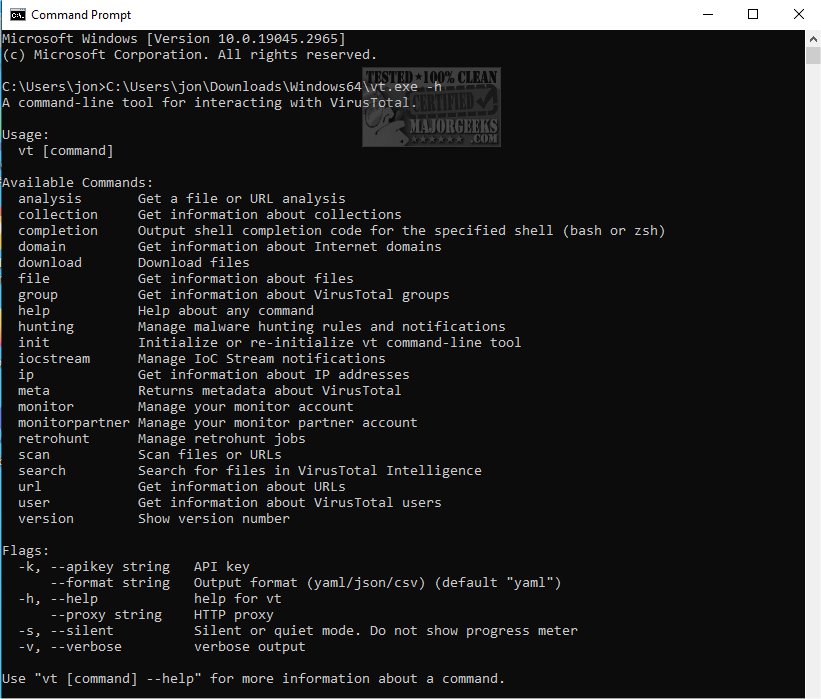The latest release, vt-cli 1.2.0, introduces an efficient Command Line Interface for engaging with VirusTotal's services, which include scanning files, checking the safety of URLs, and verifying the authenticity of IP addresses. This tool is particularly useful for security professionals looking to streamline their workflows through command-line interactions.
To utilize vt-cli, users must first obtain a VirusTotal API key, which can be acquired for free by signing up with VirusTotal. However, it's important to note that free API keys come with restrictions on the number of requests per minute and do not grant access to premium features such as advanced file searches or downloads. Setting up the API involves entering the vt-cli interface and using the 'init' command alongside the API key for authentication. For those seeking more in-depth instructions, VirusTotal's repository offers detailed guidance.
VirusTotal itself is a powerful online service that enhances security measures by aggregating data from various online sources and scanning engines. It employs proprietary Yara signatures to improve threat detection. Users can customize their experience by configuring proxy settings, accessing detailed reports, managing output files locally, and benefiting from command auto-completion for easier command entry.
For optimal performance, particularly in a Windows environment, users are advised to use Cygwin instead of the standard Windows console. The latter can struggle with large volumes of text output, which is a common scenario with vt-cli, while Cygwin is more adept at handling such tasks and also supports command auto-completion.
In summary, vt-cli 1.2.0 serves as a vital tool for enhancing security operations through a user-friendly command-line interface, making it easier for users to conduct various security-related tasks effectively.
Extension:
As cyber threats become increasingly sophisticated, the need for effective tools like vt-cli is more crucial than ever. Users can leverage vt-cli not just for individual tasks but as part of a broader cybersecurity strategy. Integration with other tools and automation of tasks through scripting can further enhance its capabilities, allowing for real-time monitoring and rapid response to potential threats. Additionally, as the landscape of cybersecurity evolves, future updates to vt-cli could incorporate machine learning algorithms to predict and preemptively block threats based on emerging patterns, making it an essential resource in the fight against cybercrime. Furthermore, community-driven enhancements and plugins could be developed to extend the functionality of vt-cli, allowing users to customize their experience and share best practices within the cybersecurity community
To utilize vt-cli, users must first obtain a VirusTotal API key, which can be acquired for free by signing up with VirusTotal. However, it's important to note that free API keys come with restrictions on the number of requests per minute and do not grant access to premium features such as advanced file searches or downloads. Setting up the API involves entering the vt-cli interface and using the 'init' command alongside the API key for authentication. For those seeking more in-depth instructions, VirusTotal's repository offers detailed guidance.
VirusTotal itself is a powerful online service that enhances security measures by aggregating data from various online sources and scanning engines. It employs proprietary Yara signatures to improve threat detection. Users can customize their experience by configuring proxy settings, accessing detailed reports, managing output files locally, and benefiting from command auto-completion for easier command entry.
For optimal performance, particularly in a Windows environment, users are advised to use Cygwin instead of the standard Windows console. The latter can struggle with large volumes of text output, which is a common scenario with vt-cli, while Cygwin is more adept at handling such tasks and also supports command auto-completion.
In summary, vt-cli 1.2.0 serves as a vital tool for enhancing security operations through a user-friendly command-line interface, making it easier for users to conduct various security-related tasks effectively.
Extension:
As cyber threats become increasingly sophisticated, the need for effective tools like vt-cli is more crucial than ever. Users can leverage vt-cli not just for individual tasks but as part of a broader cybersecurity strategy. Integration with other tools and automation of tasks through scripting can further enhance its capabilities, allowing for real-time monitoring and rapid response to potential threats. Additionally, as the landscape of cybersecurity evolves, future updates to vt-cli could incorporate machine learning algorithms to predict and preemptively block threats based on emerging patterns, making it an essential resource in the fight against cybercrime. Furthermore, community-driven enhancements and plugins could be developed to extend the functionality of vt-cli, allowing users to customize their experience and share best practices within the cybersecurity community
vt-cli 1.2.0 released
vt-cli (VirusTotal Command Line Interface) provides a Command Line interface for conducting various tasks, such as running VirusTotal scans, checking URL safety, verifying IP address authenticity, and more.


